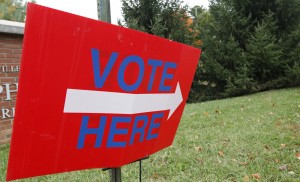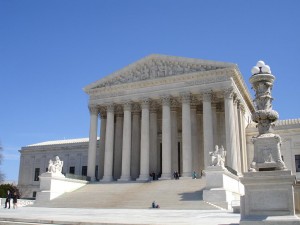Five opinions came down today from the United States Supreme Court. Read the summaries below and read the full text of the opinions at Justia’s U.S. Supreme Court Center.
Alleyne v. United States, United States Supreme Court (6/17/13)
Civil Rights, Constitutional Law, Criminal Law
 Alleyne was convicted using or carrying a firearm in relation to a crime of violence, 18 U.S.C. 924(c)(1)(A), which carries a five-year mandatory minimum sentence. The sentences increases to a seven-year minimum if the firearm is brandished, 924(c)(1)(A)(ii), and to a 10-year minimum if it is discharged, 924(c)(1)(A)(iii). The jury form indicated that Alleyne had “[u]sed or carried a firearm during and in relation to a crime of violence,” but not that the firearm was “[b]randished.” Alleyne objected to a sentencing report recommendation of a seven-year term, arguing that the jury did not find brandishing beyond a reasonable doubt and that raising his mandatory minimum sentence based on a judge’s finding of brandishing would violate his Sixth Amendment right to a jury trial. The district court overruled the objection. The Fourth Circuit affirmed.
Alleyne was convicted using or carrying a firearm in relation to a crime of violence, 18 U.S.C. 924(c)(1)(A), which carries a five-year mandatory minimum sentence. The sentences increases to a seven-year minimum if the firearm is brandished, 924(c)(1)(A)(ii), and to a 10-year minimum if it is discharged, 924(c)(1)(A)(iii). The jury form indicated that Alleyne had “[u]sed or carried a firearm during and in relation to a crime of violence,” but not that the firearm was “[b]randished.” Alleyne objected to a sentencing report recommendation of a seven-year term, arguing that the jury did not find brandishing beyond a reasonable doubt and that raising his mandatory minimum sentence based on a judge’s finding of brandishing would violate his Sixth Amendment right to a jury trial. The district court overruled the objection. The Fourth Circuit affirmed.
The Supreme Court vacated and remanded, overruling Harris v. United States, 536 U.S. 545 and applying Apprendi v. New Jersey, 530 U.S. 466. Mandatory minimum sentences increase the penalty for a crime and any fact that increases the mandatory minimum is an “element” that must be submitted to the jury. Defining facts that increase a mandatory minimum as part of the substantive offense enables a defendant to predict the applicable penalty from the face of the indictment and preserves the jury’s role as intermediary between the state and criminal defendants. Because the fact of brandishing aggravates the prescribed range of allowable sentences, it constitutes an element of a separate, aggravated offense that must be found by the jury, regardless of what sentence the defendant might have received had a different range been applicable. The Court noted that its ruling does not mean that any fact that influences judicial discretion must be found by a jury.
Read more: Supreme Court says jury should have final say on facts that trigger mandatory minimums
 This week’s legal news was dominated by four highly anticipated opinions that came down from the United States Supreme Court on affirmative action, voting rights and marriage equality. That said, our writers also found a few other opinions of note to include in their weekly picks.
This week’s legal news was dominated by four highly anticipated opinions that came down from the United States Supreme Court on affirmative action, voting rights and marriage equality. That said, our writers also found a few other opinions of note to include in their weekly picks.
 Back in February, I wrote about the
Back in February, I wrote about the Justia Opinion Summary:
Justia Opinion Summary:  Justia Summary: Since the Court’s 2003 decision,
Justia Summary: Since the Court’s 2003 decision,  The media has been closely following the criminal trial of George Zimmerman, the racially charged trial in which Zimmerman is accused of murdering teenager Trayvon Martin. Just this week, a jury of six was chosen.
The media has been closely following the criminal trial of George Zimmerman, the racially charged trial in which Zimmerman is accused of murdering teenager Trayvon Martin. Just this week, a jury of six was chosen. An agreement between American Express and merchants who accept American Express cards, requires that all of their disputes be resolved by arbitration and provides that there “shall be no right or authority for any Claims to be arbitrated on a class action basis.” The merchants filed a class action, claiming that American Express violated section 1 of the Sherman Act and seeking treble damages under section 4 of the Clayton Act. The district court dismissed. The Second Circuit reversed, holding that the class action waiver was unenforceable and that arbitration could not proceed because of prohibitive costs. The Circuit upheld its reversal on remand in light of a Supreme Court holding that a party may not be compelled to submit to class arbitration absent an agreement to do so.
An agreement between American Express and merchants who accept American Express cards, requires that all of their disputes be resolved by arbitration and provides that there “shall be no right or authority for any Claims to be arbitrated on a class action basis.” The merchants filed a class action, claiming that American Express violated section 1 of the Sherman Act and seeking treble damages under section 4 of the Clayton Act. The district court dismissed. The Second Circuit reversed, holding that the class action waiver was unenforceable and that arbitration could not proceed because of prohibitive costs. The Circuit upheld its reversal on remand in light of a Supreme Court holding that a party may not be compelled to submit to class arbitration absent an agreement to do so. Alleyne was convicted using or carrying a firearm in relation to a crime of violence, 18 U.S.C. 924(c)(1)(A), which carries a five-year mandatory minimum sentence. The sentences increases to a seven-year minimum if the firearm is brandished, 924(c)(1)(A)(ii), and to a 10-year minimum if it is discharged, 924(c)(1)(A)(iii). The jury form indicated that Alleyne had “[u]sed or carried a firearm during and in relation to a crime of violence,” but not that the firearm was “[b]randished.” Alleyne objected to a sentencing report recommendation of a seven-year term, arguing that the jury did not find brandishing beyond a reasonable doubt and that raising his mandatory minimum sentence based on a judge’s finding of brandishing would violate his Sixth Amendment right to a jury trial. The district court overruled the objection. The Fourth Circuit affirmed.
Alleyne was convicted using or carrying a firearm in relation to a crime of violence, 18 U.S.C. 924(c)(1)(A), which carries a five-year mandatory minimum sentence. The sentences increases to a seven-year minimum if the firearm is brandished, 924(c)(1)(A)(ii), and to a 10-year minimum if it is discharged, 924(c)(1)(A)(iii). The jury form indicated that Alleyne had “[u]sed or carried a firearm during and in relation to a crime of violence,” but not that the firearm was “[b]randished.” Alleyne objected to a sentencing report recommendation of a seven-year term, arguing that the jury did not find brandishing beyond a reasonable doubt and that raising his mandatory minimum sentence based on a judge’s finding of brandishing would violate his Sixth Amendment right to a jury trial. The district court overruled the objection. The Fourth Circuit affirmed.